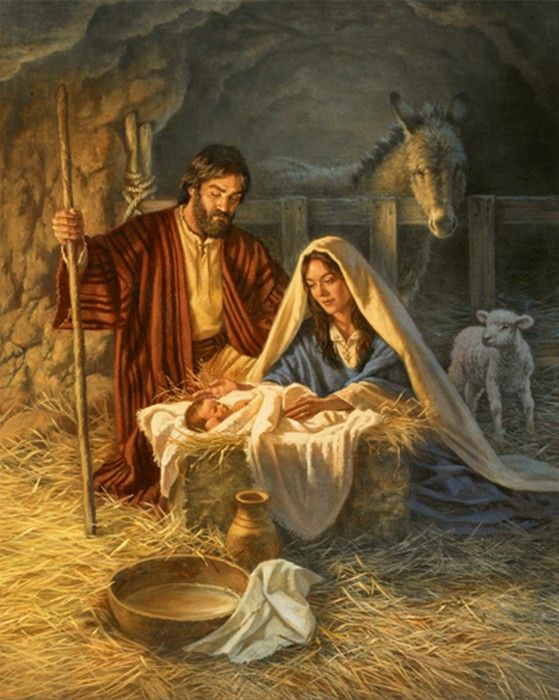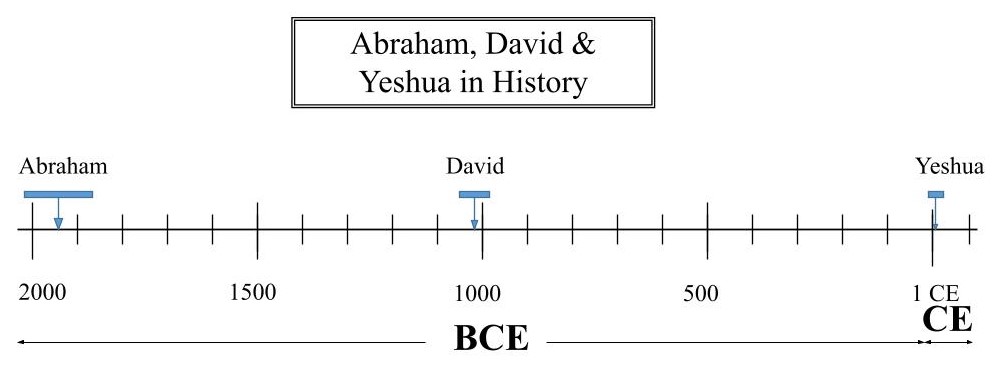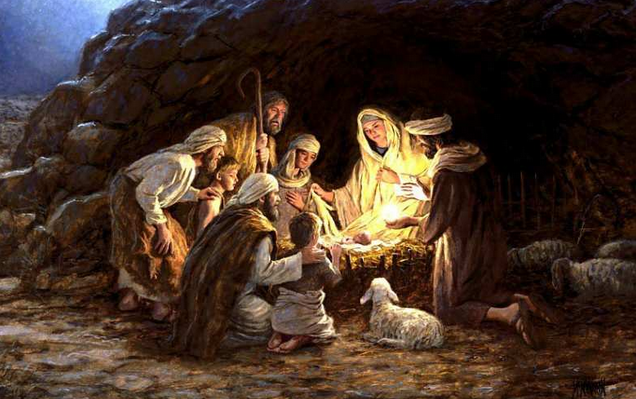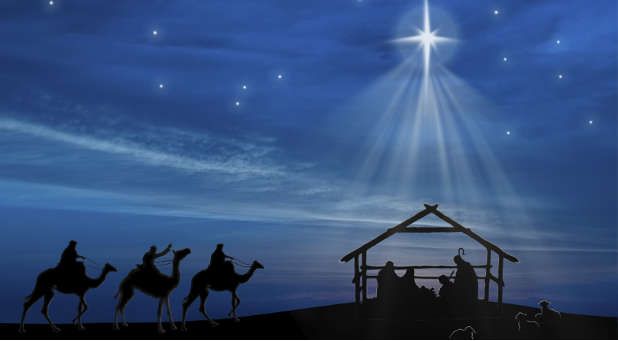Christmas has distinction as the premier global festival, celebrated by nations around the world, except by the people who birthed the tradition – the Jews. Nations celebrate Christmas in diverse ways across the globe but music and song always form the core of its celebration. And Jews have been among those who have richly contributed to Christmas music. From Jewish composers Irving Berlin’s ‘A White Christmas’, Mel Torme’s ‘Chestnuts roasting on an open fire’ or Walter Kent’s “I’ll be home for Christmas”, Jewish musical genius has made its contribution to Christmas celebrations the world over.
The Jewish Birth Story – better than Santa

Beyond the music, the food, the decorations, and festivities, Christmas celebrates the birth of a boy – a Jewish boy. In fact, almost all the characters making up the drama of this boy’s birth are Jewish. One of the two writers who recorded the story was also Jewish – a Levite even.
And the intrigue, suspense and celebration surrounding the birth of this Jewish baby, recorded by a Jewish Levite, make the later Christmas add-ons like Santa Claus, the North Pole, and elves in Santa’s workshop pale in comparison.
Levi, also known as Matthew, wanted us to know for certain that the baby boy he wrote about was Jewish. So he opened his narrative with this sentence, the first sentence in the Brit Chadasha.
This is an account of the origin of Jesus (Yeshua) the Messiah the son of David, the son of Abraham (Avraham).
Matthew 1:1
Not only a son of Abraham (Avraham) as are all Jews, but also a descendant of the legendary King David! What other theme could evoke greater expectancy? Certainly not Santa.

Jesus’ (Yeshua’s) Birth Recounted
What were the circumstances surrounding Yeshua’s birth? Matthew tells us in striking detail.
18 This is how the birth of Jesus the Messiah came about: His mother Mary was pledged to be married to Joseph, but before they came together, she was found to be pregnant through the Holy Spirit. 19 Because Joseph her husband was faithful to the law, and yet did not want to expose her to public disgrace, he had in mind to divorce her quietly.
20 But after he had considered this, an angel of the Lord appeared to him in a dream and said, “Joseph son of David, do not be afraid to take Mary home as your wife, because what is conceived in her is from the Holy Spirit. 21 She will give birth to a son, and you are to give him the name Jesus, because he will save his people from their sins.”
22 All this took place to fulfill what the Lord had said through the prophet: 23 “The virgin will conceive and give birth to a son, and they will call him Immanuel” (which means “God with us”).
24 When Joseph woke up, he did what the angel of the Lord had commanded him and took Mary home as his wife. 25 But he did not consummate their marriage until she gave birth to a son. And he gave him the name Jesus.
Matthew 1:18-25
Luke’s Details of Yeshua’s Birth

Luke, another Gospel writer, elaborates on the events of Yeshua’s birth with this account:
In those days Caesar Augustus issued a decree that a census should be taken of the entire Roman world. 2 (This was the first census that took place while Quirinius was governor of Syria.) 3 And everyone went to their own town to register.
4 So Joseph also went up from the town of Nazareth in Galilee to Judea, to Bethlehem the town of David, because he belonged to the house and line of David. 5 He went there to register with Mary, who was pledged to be married to him and was expecting a child. 6 While they were there, the time came for the baby to be born, 7 and she gave birth to her firstborn, a son. She wrapped him in cloths and placed him in a manger, because there was no guest room available for them.
The Shepherds
8 And there were shepherds living out in the fields nearby, keeping watch over their flocks at night. 9 An angel of the Lord appeared to them, and the glory of the Lord shone around them, and they were terrified. 10 But the angel said to them, “Do not be afraid. I bring you good news that will cause great joy for all the people. 11 Today in the town of David a Savior has been born to you; he is the Messiah, the Lord. 12 This will be a sign to you: You will find a baby wrapped in cloths and lying in a manger.”
13 Suddenly a great company of the heavenly host appeared with the angel, praising God and saying,
14 “Glory to God in the highest heaven,
and on earth peace to those on whom his favor rests.”
15 When the angels had left them and gone into heaven, the shepherds said to one another, “Let’s go to Bethlehem and see this thing that has happened, which the Lord has told us about.”
16 So they hurried off and found Mary and Joseph, and the baby, who was lying in the manger. 17 When they had seen him, they spread the word concerning what had been told them about this child, 18 and all who heard it were amazed at what the shepherds said to them. 19 But Mary treasured up all these things and pondered them in her heart. 20 The shepherds returned, glorifying and praising God for all the things they had heard and seen, which were just as they had been told.
Luke 2:1-20
The Visit of the Wise Men to Bethlehem
Usually included in the Nativity story is the visit of the Wise Men, which Matthew picks up for us:
2 After Jesus was born in Bethlehem in Judea, during the time of King Herod, Magi from the east came to Jerusalem 2 and asked, “Where is the one who has been born king of the Jews? We saw his star when it rose and have come to worship him.”
3 When King Herod heard this he was disturbed, and all Jerusalem with him. 4 When he had called together all the people’s chief priests and teachers of the law, he asked them where the Messiah was to be born. 5 “In Bethlehem in Judea,” they replied, “for this is what the prophet has written:
6 “‘But you, Bethlehem, in the land of Judah,
are by no means least among the rulers of Judah;
for out of you will come a ruler
who will shepherd my people Israel.’”
Herod’s Craftiness foiled
7 Then Herod called the Magi secretly and found out from them the exact time the star had appeared. 8 He sent them to Bethlehem and said, “Go and search carefully for the child. As soon as you find him, report to me, so that I too may go and worship him.”
9 After they had heard the king, they went on their way, and the star they had seen when it rose went ahead of them until it stopped over the place where the child was. 10 When they saw the star, they were overjoyed. 11 On coming to the house, they saw the child with his mother Mary, and they bowed down and worshiped him. Then they opened their treasures and presented him with gifts of gold, frankincense and myrrh. 12 And having been warned in a dream not to go back to Herod, they returned to their country by another route.
Matthew 2:1-12

Herod in the Christmas Plot
This Herod perplexed about Yeshua’s birth is Herod the Great. He leaves his imprint in Israel still today, visible in the ruins at the Temple Mount, Masada and Caesarea. Christmas tells a tale of a tyrannical ruler determined to stamp out the vulnerable. This parallels what so many Jews around the world today and through history have similarly experienced.
Messiah Controversies steal Christmas
But it is not so much the perils in the Christmas story that evoke Jewish resonance, but also the controversies. After all, the themes used by Matthew in recounting the Christmas Nativity Story are decidedly Jewish. Matthew reaches back to the prophets Isaiah and Jeremiah to give meaning to the events he records. He uses the Jewish title ‘Messiah’ to describe the birth of the baby Jesus (Yeshua).
This brings us to the nub of the issue. Though Christmas has decidedly Jewish roots, the prevailing Jewish view is that his brethren long ago settled the the status of this Jew to the negative. That is, Jews have decided that Yeshua was not the Messiah – case closed. Perhaps Gentiles came to the opposite conclusion but Jews universally rejected the idea of Yeshua as Messiah. Thus Jews also had to discard Christmas. As the Grinch stole Christmas the force of this logic has stolen Christmas from many.
But what if …?
But perhaps one can reverse the order of investigation. Leave aside Yeshua’s Messiahship to simply explore questions arising from the Christmas story. Does Jewish tradition say anything about the Christmas themes of virgin birth and David’s line? In fact, accepted Jewish writings provide valuable insight to these Christmas story questions. As the (Jewish) shepherds decided to check for themselves when they heard the unbelievable angelic message of the baby’s birth in Bethlehem, so we too can examine for ourselves a Jewish perspective on these Jewish questions. If nothing else, perhaps with this understanding we can, like Mary, ‘ponder these things in our hearts’ and greet one another with a ‘Merry Christmas’.
We look at these sources, what they say, and what it means here.
This is very well written… But my more recent discoveries have added a whole new dimension. If we go back to Daniel 2, we discover the a glimpse of kingdoms to come in sequence. Five earthly kingdoms before reaching the kingdom that lasts forever and without end and given to no people.
Head of Gold – Babylon
Shoulders of Silver – Meads and Persians
Hips of Bronze – Greeks
Legs of Iron – Rome
* Feet of Iron and Clay – Rome & Israel (Israel in Jesus Day)
You see old Jerusalem was a very powerful and dominating city at the time. It was the center of the world for religious faith and economic prosperity. Everyone traded with Jerusalem. While the two political powers ruled together, they did not mix, just as the description Daniel describes. In fact this is underscored during Jesus trial when He is taken before both authorities when He is presented for crucifixion. And just as in Daniels story, the stone not made with hands destroys the feet which is a parallel to Jerusalem in 70AD when this great city is leveled and destroyed, never to rise again in such a world dominating stance for faith and trade.
Then jump forward to Malachi….. The OT closes, the curtain drops with a promise, (due to the many abuses of leadership) Elijah will introduce the one who will remove all these abuses and set things right. So the last word from the prophets is, THEIR DOOM IS COMING, end of Act I.
So it is when the curtain rises for Act II of our Bible, as predicted, a son is born, the Messiah. The time was right, he was expected, and we are taken on a journey revealing how this new everlasting kingdom does not come with power and might but rather through light and love. Jesus even mentions, “Until John, the kingdom was taken by force.” signaling another path to power has come.
It is no wonder “traditional” Jews reject Jesus for it is they that refuse to believe Jesus destroyed to old abuses and has now established His kingdom that will never be given to any peoples of earth to be the keepers of the gate. Jesus Himself builds His church as we each come to the greater realization of CHRIST IN US. We have NO KING BUT KING JESUS!
In deed this is very good news, but I’m totally disagree with this Christmas which people use to say is Jesus Christ birthday, now! My question is that, as Jesus Christ was born on 24 December or on which of the month Christ was born??? I need more explanation
If Jesus Christ was conceived on the month of June which was the sixth month and gave birth by ninth month which was March why it is December 25???